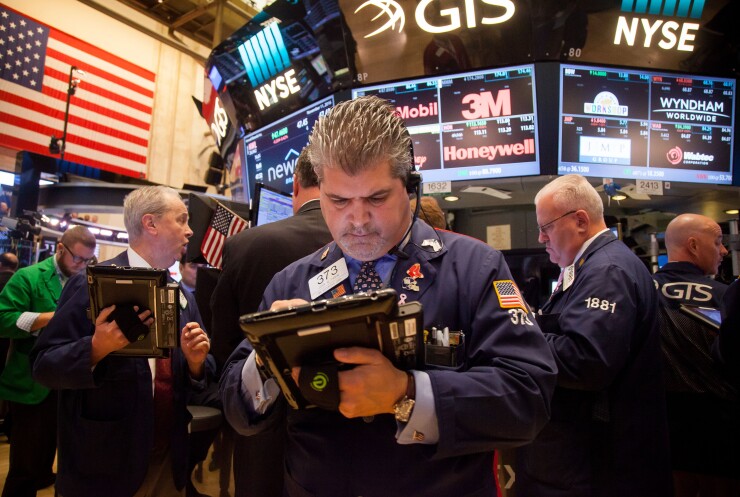(Bloomberg) -- Bond traders are the smart money goes the old markets maxim.
And when it comes to how markets have been pricing post Donald Trump's election win, Goldman Sachs is inclined to believe it.
The stunning run in equities "post-Trump appears to have looked past the fact that the economy is already running close to full employment," write analysts Charles Himmelberg and James Weldon.

This implies that any new tailwind for U.S. activity — say, from a massive fiscal stimulus — would end up boosting inflation more than growth as it would force the economy to rub up against its supply-side constraints. Economic output can only grow as much as the labor and capital available to produce it — and an aging U.S. population places a demographic damper on available man-hours of work.
"So far, the [currency] and bond markets appear to have the firmer grip on this reality," write the Goldman pair.
The main market impacts of fiscal stimulus will be higher inflation and real interest rates, which are positive for the U.S. dollar but not necessarily so for risk assets, they argue.
This argument is further reinforced by Federal Reserve Chair Janet Yellen's apparent hawkish lurch in her press conference last week, in which she said the labor market was "in the vicinity of full employment" and threw cold water on the idea that she wants to see the economy run hot.
For the supply side, Trump's policies are a mixed bag, per Goldman: capping immigration reduces potential growth, while deregulation and tax reform that helps spur investment could increase the U.S. economy's top speed. The Fed, in other words, might be ready to tighten policy to serve as a monetary offset to any fiscal expansion.
For equity markets, the potential for a swifter pace of rate hikes from the central bank in the face of meaningful fiscal expansion constitutes a "contingent knock-in" trigger for the "Yellen call," or Goldman's theory that rallies in stock prices would elicit more tightening from the Fed chair that would limit further upside.
Rallies in stock prices are an easing of financial conditions, which fly in the face of the ultimate goal of the Fed's hiking cycle: to incrementally tighten financial conditions to smooth the business cycle.
As such, the analysts expect stock rallies to "prove self-defeating."
"Contingent on fiscal stimulus, the FOMC will now need to respond even more aggressively to any easing of financial conditions," conclude Himmelberg and Weldon. "The available evidence suggests to us that the long-run potential growth rates of the U.S. and global economies are still in a 'low growth' regime, suggesting that the equity market party will be at risk when the punchbowl goes out."





